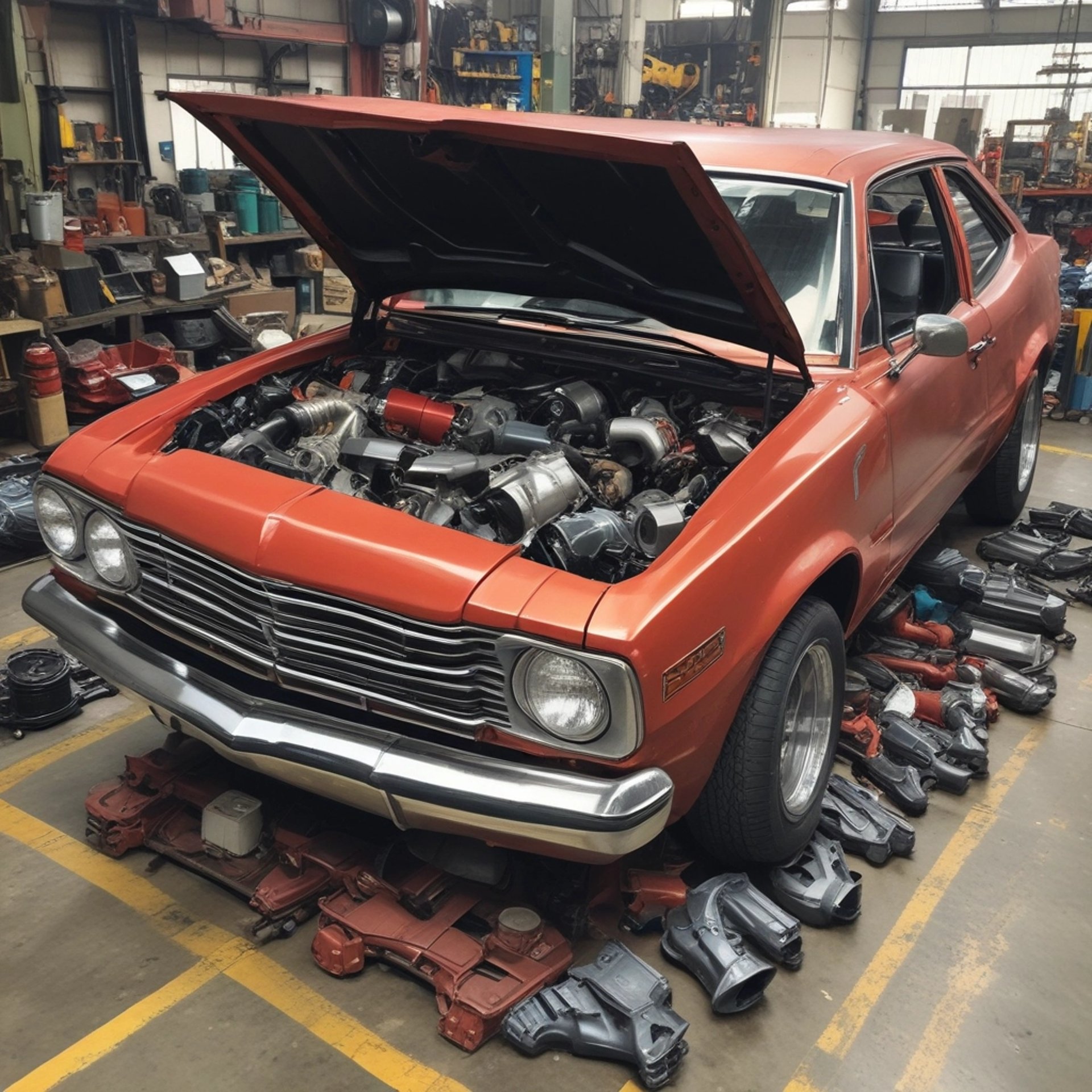The Importance of Genuine Spare Parts for Your Vehicle
4 min read

Understanding OEM Parts: Definition and Benefits
Original Equipment Manufacturer (OEM) parts refer to the components that are produced by the same manufacturer that made the original parts used in the vehicle during its assembly. These parts are identical in quality and specifications to those initially included in the vehicle, assuring a seamless integration with the existing systems. The significance of OEM parts lies in their strict adherence to the manufacturer's standards, meaning they have been designed, tested, and manufactured to match the precise parameters set forth by the automaker.
One of the primary advantages of using OEM parts is their precise fit. Unlike aftermarket components, which may vary in quality and compatibility, OEM parts are guaranteed to fit perfectly with the vehicle's specifications. This perfect fit helps to maintain the overall integrity of the vehicle's systems, reducing the likelihood of mechanical issues that can arise from the use of ill-fitting components. In turn, this contributes to the operational safety and performance of the vehicle.
In addition to compatibility, OEM parts are typically manufactured to the same standards as the original components. This means they undergo rigorous quality control processes ensuring that they provide consistent performance over time. By choosing OEM parts, vehicle owners can enjoy enhanced reliability compared to aftermarket alternatives. Aftermarket parts may save money initially, but they often lack the same levels of performance and durability, leading to potential long-term costs in repair and maintenance.
Furthermore, using OEM parts can significantly impact the vehicle's resale value. Cars that have been maintained with genuine parts are more appealing to potential buyers, as they signal adherence to quality maintenance standards. Ultimately, the investment in OEM parts can lead to improved performance, enhanced safety, and prolonged lifespan of the vehicle, making them an essential consideration for any vehicle owner.
Durability and Longevity: The Key to Vehicle Reliability
Investing in genuine spare parts significantly enhances the durability and longevity of your vehicle, making it a key component in maintaining overall vehicle reliability. Original Equipment Manufacturer (OEM) parts are designed specifically for your vehicle's make and model, ensuring an exact fit and optimal performance. The materials used in the production of genuine parts undergo rigorous testing and adhere to stringent quality standards. This rigorous manufacturing process results in components that are inherently more durable than many aftermarket alternatives.
One major advantage of genuine parts is their superior engineering quality. OEM components are developed with advanced technology and precision, allowing them to withstand the everyday stresses of driving. For instance, genuine brake pads are made from higher-grade materials that ensure better performance, minimizing wear and reducing the likelihood of premature failure. In contrast, lower-quality aftermarket parts often use substandard materials, leading to increased wear and tear and, ultimately, more frequent replacements.
Although the initial cost of genuine spare parts may be higher than their aftermarket counterparts, it is crucial to consider the long-term financial implications. Frequent replacements of lower-quality parts can accumulate substantial expenses over time, not only in purchasing the parts themselves but also in the labor costs associated with their installation. By choosing genuine parts, vehicle owners are likely to experience fewer repairs and a longer lifespan for their vehicle, making it a more economical choice in the long run.
In summary, opting for genuine spare parts is essential for ensuring the durability and longevity of your vehicle. By investing in OEM components, vehicle owners can enhance reliability, reduce the frequency and costs of repairs, and ultimately enjoy a more dependable driving experience.
Safety First: OEM Parts and Vehicle Safety
Ensuring vehicle safety is paramount for both drivers and passengers. One critical aspect of maintaining this safety is the use of genuine spare parts, specifically Original Equipment Manufacturer (OEM) parts. OEM parts are designed and manufactured to specific standards, adhering to rigorous testing protocols that assess their safety and performance. By integrating these components into a vehicle, owners can be confident that they meet the safety requirements dictated by regulatory bodies.
One major advantage of OEM parts is that they are constructed to fit precisely within the vehicle's systems, mirroring the specifications of the original components. This precision plays an essential role in a vehicle's operational safety. For instance, a properly fitting brake pad not only functions efficiently but also ensures that other related systems, such as the anti-lock braking system, work flawlessly. Using generic or aftermarket parts can lead to compatibility issues, potentially undermining the effectiveness of safety features designed to protect occupants in an emergency.
In contrast, aftermarket parts often lack the same level of oversight and quality assurance as OEM components. They may be manufactured with lower-quality materials or without adequate testing for safety standards. This discrepancy raises serious concerns, particularly in critical vehicle systems like brakes, steering, and airbags. In the unfortunate event of a mechanical failure during operation, the ramifications of using substandard aftermarket components can be catastrophic, leading to accidents or injuries that could have been avoided with genuine parts.
Ultimately, prioritizing the use of OEM parts not only enhances vehicle safety by ensuring compliance with the highest safety standards but also safeguards against the unpredictable risks associated with inferior alternatives. Protecting yourself and your passengers begins with making informed choices about the parts that comprise your vehicle.
Optimal Performance: Enhancing Your Vehicle's Efficiency
In the realm of automotive maintenance, the use of genuine spare parts holds significant importance for ensuring optimal performance across various dimensions of a vehicle. When vehicle owners opt for Original Equipment Manufacturer (OEM) parts, they often notice substantial improvements in fuel efficiency, handling, and overall engine performance. OEM parts are meticulously designed to meet the specifications set forth by the vehicle manufacturer, which ensures that they are compatible with the vehicle’s unique design and operational requirements.
The efficiency of a vehicle heavily relies on the seamless interaction between its components. Genuine spare parts are engineered to work in harmony with existing systems, reducing friction and wear. For instance, using an OEM oil filter can improve the filtration of impurities, resulting in a cleaner oil supply that supports better engine performance. In contrast, inferior aftermarket parts may not meet these crucial design specifications, potentially leading to increased fuel consumption and decreased overall efficiency, which can burden the vehicle’s engine over time.
Furthermore, when it comes to handling, genuine spare parts, such as braking or suspension components, are crucial for maintaining stability and safety while driving. These parts are tested extensively to ensure they perform optimally under various conditions. Using substandard alternatives can significantly compromise a vehicle's handling, resulting in a less responsive driving experience and increased risk of accidents.
Overall, the choice to invest in OEM parts can enhance a vehicle owner’s driving experience while also preserving the value of their investment. By prioritizing genuine parts, individuals can ensure that their vehicle operates at peak efficiency, ultimately providing a safer and more enjoyable ride.
About the company
Auto Tarun Pvt Ltd ( ESSARR 4X4 ), founded in October 2021, is your trusted partner for high-quality multi-car spare parts and accessories.
Contact us
autotarun.india@gmail.com
+91 9740606290 / +91 9902004345
© 2024 Auto tarun Pvt Ltd All rights reserved.
Mon -Sat : 9:30 am to 6:30 pm
NO.39 (MIG, 80 Feet Rd, Kengeri Satellite Town, Bengaluru, Karnataka


GSTIN : 29AAVCA9568M1ZD
Email:
Get in Touch
Call:
